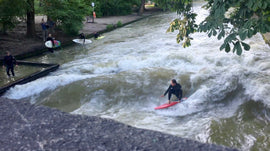"OH SAY, CAN YOU SEE?"
The National Anthem of the United States of America is not a statement. It's a question. And we, my friends, are the nation in question.
I was standing side stage with a mic in my hand getting ready to sing the national anthem at a NASCAR race. The top 8 finalists for a popular TV singing contest just got up and crushed "God bless America." And I'm supposed to just go ahead and sing the anthem. No accompaniment, just me. So I start in.
And then halfway through the anthem, my renegade mind starts to wander. Instead of focusing on the lyrics and pitch and making it through to "the home of the brave," my brain starts to analyze the sentence structure. For the record, I'm not the guy to parse out sentence structure. Besides, even if our nation's anthem is grammatically fascinating, syntax was probably the worst thing I could be thinking about right then. Distraction from the task at hand could lead to angry NASCAR fans, and angry NASCAR fans is never the goal.
So there I was- still singing this anthem. Still thinking about grammar. It was an out of body experience. I was in three places at once; my mouth and my lungs were singing; my brain was pondering the syntax; and something beyond my brain was yelling at my brain to pay attention.
Nonetheless, that was the moment that I realized what the National Anthem of the United States of America meant to me. And it all comes down to punctuation.
Our national anthem consists of two meandering questions with a wandering statement in between. The first question is an incredibly long, run-on sentence that's especially easy to get lost in. The first part goes like this:
"Oh say can you see
by the dawn's early light,
what so proudly we hailed
at the twilights last gleaming..."
This would be a good place to begin a new sentence but the question continues with more specifics about about the flag:
"...whose broad stripes and bright stars,
through the perilous fight
o'er the ramparts we watched
were so gallantly streaming?"
Here we get a little more context of this perilous fight and some glowing adjectives describing the flag. The second sentence talks a bit more about the battle that went on during the night:
"And the rockets red glare,
the bombs bursting in air,
gave proof through the night
that the flag was still there."
This second sentence, annunciates that even through the dark night of battle the flag was still there, (lit up by the light of exploding rockets and bombs).
It's worth noting that even though we're almost to the end of the anthem there has been almost no mention of the nation over which the flag stands. There's been a lot of specifics about the flag and the battle but nothing about liberty or justice. Or honor or patriotism. Just pride in hailing the flag in the twilight. The anthem concludes with yet another question:
"Oh say does that star spangled banner yet wave,
o'er the land of the free and the home of the brave?"
And now, in the final two lines of the song we hear our first few details about the people who hail the flag, who are purportedly free and brave. And as I stood singing those words onstage in front of NASCAR enthusiasts, I realized something I had never thought about before. The most important, most overlooked aspect of the national anthem is this: It's not a declaration. It's a question. "Does the banner yet wave over the land of the free and the home of the brave?"
Since we're singing these words while staring at the flag, the question is not whether or not the flag is still there. The question is for us is this: are we the "land of the free and the home of the brave?" Who are we the people? What is the character of the nation underneath the flag? Do we empower and uphold the freedom and bravery of others, or does our flag wave over a different kind of land?
Lately, the posture of professional athletes during our national anthem has become a point of tension. You might see the actions of Colin Kaepernick and others as a strong non-violent protest- a beautiful way to draw the attention of the nation to parts of America that are less than beautiful. Or maybe, you are irate because you've concluded this gesture can only mean that the anthem of the country you love is being disrespected. Maybe you feel that their posture goes too far. Even though the players have carefully explained (and will continue to explain), that they aren't disrespecting the flag or the nation, perhaps their actions offend you.
For those of you who disagree with the players who are taking a knee, I ask for you to to be brave and embrace the freedom that the anthem portrays. To silence all voices but your own is not strength, but weakness. It takes bravery to allow others to peacefully disagree with you. It takes courage to step outside of your comfort zone and begin to listen to another's perspective. Remember, these players are not protesting the flag or the anthem- they are using this moment to protest inequality, police brutality, and racial injustice. If these shameful elements were less present in our society, there would be no need to protest.
If you are upset about folks kneeling during the anthem, consider this: perhaps the player protesting during the anthem believes in a bigger America than you do. Maybe they believe that our freedom (particularly our freedom of speech), is larger than you believe it to be. Maybe they believe in an America whose justice fully embraces racial equality. Could it be that they are kneeling to bring attention to the parts of our land that is neither free nor brave? Hoping to see a land that lives up to our anthem, a land that is freer and braver than the America we live in?
Maybe bravery is doing the right thing in the face of danger. Even when your scared. Maybe a land is free only when the folks in charge abstain from imposing their restrictions on the folks who disagree with them. Ask yourself an honest question, if the players were kneeling to draw attention to fallen soldiers, do you think our society would have a problem with their posture? Are we offended by the manner in which these players are protesting? Or is it the content of what they are protesting?
Yes, I'm proud of my country. I'm proud of my grandfathers, my friends, and neighbors who have fought for our freedom. Even though it's hard to sing, I truly appreciate our national anthem. And yet, blind nationalism cannot help us forward. After all, America is a nation in process. Not unlike her anthem, America is more of a question mark than a statement. Our nation is an ongoing experiment chasing after ideals like liberty, honor, and justice for all. A nation of immigrants defined by a promise, rather than a nationality or a geography or a language.
Who gets to decide what America means? They do. You do. I do. We the people choose our path. "Does that star spangled banner yet wave, o'er the land of the free, and the home of the brave?" You tell me. After all, The National Anthem of the United States of America is not a statement. It's a question. And, we are the nation in question.



